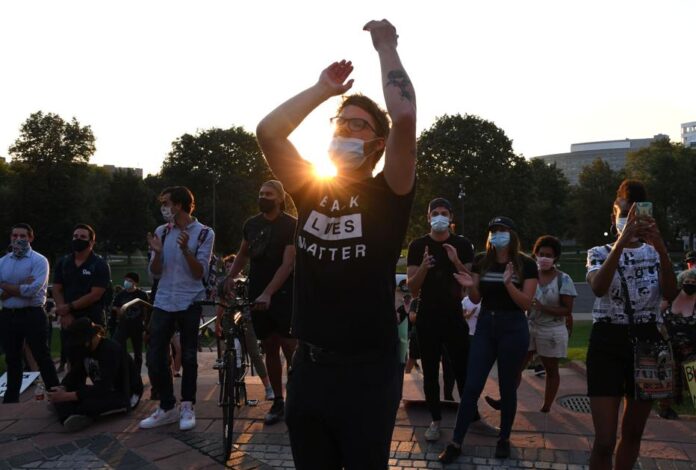What you think is fair and what Washington thinks is fair are probably two different things.
In a democracy, you could do something about that. In reality all you can do is cast a ballot on Nov. 3 and complain a lot, not necessarily in that order.
Our perceptions of reality are distorted, and it didn’t take much to get us there. A guy I went to high school with shared a Facebook post recently that told other older, white people that they were being lied to by the media (and apparently the cops): Breonna Taylor wasn’t shot in bed. She was actively stashing drug money in her apartment, and she’s not an EMT, either.
The alleged source is “a zookeeper” from Oklahoma. Wow, just like Joe Exotic. That should have been a tipoff to people sharing it. Social media crowns nonsense and malignant disinformation with the same credibility as the Encyclopedia Britannica, until a Joe Exotic knockoff seems credible.
If you’re not looking at your news feed and saying, “Are you serious?” then people are probably saying it about you.
Yet, the news is so crazy, you can hardly blame people.
That’s kind of the feeling you get with this Supreme Court situation. In March 2016, as Republicans held up his Supreme Court nomination for what would be 14 months before Coloradan Neil Gorsuch was seated, President Obama called what was to come.
An article in Salon magazine on Sept. 21 explained why it matters. The title smacked of truth, and I do mean smacked: “Why America’s political fights are as fake as pro wrestling.”
The piece was written by Chicago criminal defense attorney Leonard C. Goodman, who owns the news website Reader:
”As academic studies have shown, the wishes of ordinary Americans have little or no impact on the makings of federal government policy. (The single exception to this rule is for issues that don’t impact the bottom line of the investor class, such as reproductive rights and identity politics; on these issues ordinary Americans can sometimes get their voices heard.) In other words, your opinion about most important issues carries zero weight unless you are a major donor or a bundler of donation checks. These truths about American politics help explain why the largest single voting bloc in America—nearly half of eligible voters—choose to stay home on Election Day.”
The game is rigged? No avenue for democracy? We’re in worse shape than I thought. I hoped to interview Goodman, but his publicist never replied. I’m that important.
I needed optimism and insight. Luckily I’m friends with two experts in both.
Kent Thiry, the retired CEO of Davita Inc., is Mr. Automatic on Colorado’s ballot.
“I think he is a few degrees off, maybe more,” Thiry replied in a recent email, when I flagged the article to his attention the day after it came out.
He characterized political mood more as pendulum than a three-card monte.
“Some other voters do in fact have far more significant political power than he thinks, separate from the power of money players, who do wield excessive power,” Kent told me. “The good old reliable base voters for each side, where positions are extreme and turnout is the name of the game. “
That makes legislative compromise nearly impossible, KT — he goes by KT now — continued.
“And every X years there is a wave election as the mobile middle voters, out of disgust with the continued lack of progress, shifts away from the recent incumbents and the other side wins the trifecta of executive and both chambers of Congress.”
Whether power corrupts completely, who knows, but Thiry says it usually prevails; that’s why they call it power.
“Because of the prevailing power of the base voters the trifecta winning party overreaches with noncentrist policies, until the mobile middle gets frustrated yet again,” he said, implying a but: “While the middle is present, it is not represented proportionate to its actual membership, not even close.”
I checked in with Tom Cosgrove, the filmmaker, politico and an explorer of hope.
Tom produced the documentary ”Divided We Fall: Unity Without Tragedy,” that asked what it means to be an American anymore. The picture made its world premiere April 30 on Rocky Mountain PBS, before going national on American Public Television on May 20. You can watch it on the Rocky Mountain PBS website until May 2022 by clicking here.
Last month, Tom urged the networks covering election night not to juggle the breakable glass of our currently fragile democracy. He’s long worried about the media turning serious subjects into competitive entertainment, which prioritizes spectators over thinkers.
Tom, like Kent, remains an optimist.
“Donors don’t vote; the people do,” he told me, turning to Goodman. “What’s missing from this analysis is how we the people allowed politics and governance to become entertainment and in the process numbed a significant chunk of our population from participating in our democracy.”
He followed up our email exchange about hope with links to two stories about what happens if a defeated President Trump fails to yield to a peaceful transition of power.
As parties go, you have two choices, but increasingly it seems like two sides of awful. My unaffiliated status never looked so good.









